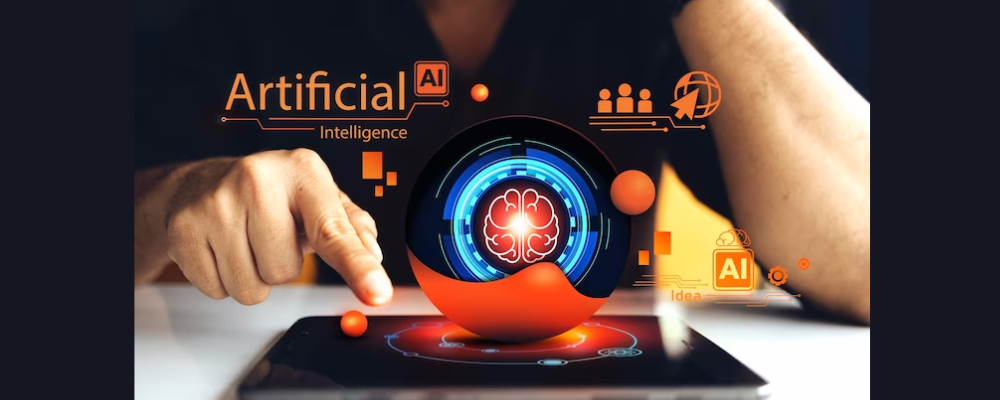In today’s hyper-competitive digital landscape, businesses are constantly seeking innovative ways to stand out and thrive. One such game-changing tool in the marketer’s arsenal is Artificial Intelligence (AI). Imagine having a tireless assistant who not only identifies potential customers but also predicts their needs and preferences before they even realize them. That’s the power of AI in lead generation.
In this era of information overload, grabbing the attention of potential customers has become increasingly challenging. That’s where lead generation comes in, serving as the lifeblood of business growth. From startups to multinational corporations, generating quality leads is crucial for sustaining and expanding operations.
Now, combine the necessity of lead generation with the capabilities of AI, and you’ve got a recipe for unparalleled success. AI doesn’t just automate tasks; it revolutionizes the way businesses understand and engage with their target audience. By harnessing the power of data analytics, machine learning, and natural language processing, AI empowers businesses to not only identify leads but also tailor personalized experiences that resonate deeply with them.
The Basics of AI in Lead Generation
Artificial Intelligence, or AI, isn’t just a buzzword anymore; it’s a revolutionary technology shaping the future of marketing. At its core, AI refers to machines simulating human intelligence to perform tasks that typically require human intelligence. In the realm of marketing, AI acts as a strategic ally, enabling businesses to analyze vast amounts of data, predict consumer behavior, and automate processes at an unprecedented speed and scale. From identifying potential leads to personalizing marketing campaigns, AI enhances efficiency and effectiveness in modern marketing practices.
Why AI is Essential for Lead Generation
In today’s fast-paced digital landscape, traditional lead generation methods often fall short in delivering desired results. This is where AI steps in to fill the gap. Unlike manual lead generation processes, AI-powered systems can process enormous volumes of data in real-time, allowing businesses to identify promising leads swiftly and accurately. Moreover, AI’s ability to analyze customer interactions, preferences, and past behaviors enables businesses to tailor personalized marketing strategies that resonate with individual leads, ultimately increasing conversion rates and maximizing ROI.

AI employs a variety of techniques to revolutionize lead generation. Machine learning algorithms, for instance, analyze historical data to predict future outcomes and identify patterns indicative of potential leads. Natural language processing (NLP) enables AI systems to understand and interpret human language, facilitating more meaningful interactions with leads through chatbots and virtual assistants. Additionally, predictive analytics leverages AI to forecast future trends and behaviors, empowering businesses to stay ahead of the curve in lead generation efforts.
Setting Up Your AI Lead Generation Strategy
Identifying Your Target Audience:
- The first step in setting up an AI lead generation strategy is to clearly define your target audience. By understanding the demographics, preferences, and pain points of your ideal customers, you can effectively tailor your AI-powered marketing efforts to resonate with their needs. Utilize AI-driven market research tools to gather valuable insights and refine your target audience profiles for more precise targeting.
Selecting the Right AI Tools and Platforms:
- With a plethora of AI tools and platforms available in the market, choosing the right ones for your business can be daunting. Start by evaluating your specific lead generation needs and objectives. Whether it’s lead scoring, predictive analytics, or chatbot integration, select AI tools that align with your goals and seamlessly integrate with your existing marketing stack. Consider factors such as scalability, ease of use, and compatibility with your current systems when making your selection.
Integrating AI with Your Existing Marketing Stack:
- Successful AI lead generation strategies don’t operate in isolation; they seamlessly integrate with existing marketing processes and technologies. Whether you’re utilizing CRM systems, email marketing platforms, or social media management tools, ensure that your AI solutions complement and enhance your existing infrastructure. Collaborate with your marketing and IT teams to streamline the integration process and maximize the efficiency and effectiveness of your AI-powered lead generation efforts.
Leveraging AI for Content Creation and Distribution
Gone are the days of one-size-fits-all content. AI empowers businesses to create highly personalized content tailored to the unique preferences and interests of individual leads. By analyzing data on past interactions, browsing behavior, and demographic information, AI algorithms can generate content that resonates deeply with each target audience segment. Whether it’s dynamically generating email subject lines, crafting personalized product recommendations, or customizing website experiences, AI enables businesses to deliver content that engages and converts leads at a much higher rate.

Once you’ve created compelling content, the next step is to ensure it reaches the right audience at the right time. AI streamlines the content distribution process by automating tasks such as scheduling social media posts, optimizing email send times, and identifying the most relevant channels for content promotion. By leveraging AI-powered content distribution tools, businesses can maximize their reach and engagement while minimizing manual effort and resources. Whether it’s targeting specific audience segments, optimizing ad placements, or A/B testing messaging variations, AI ensures that your content reaches its intended audience with precision and efficiency.
Creating and distributing content is only half the battle; optimizing it for lead generation is equally important. AI provides valuable insights into content performance, allowing businesses to identify which pieces resonate most with their target audience and drive meaningful engagement. By analyzing metrics such as click-through rates, conversion rates, and time spent on page, AI can uncover patterns and trends that inform content optimization strategies. Whether it’s refining messaging, adjusting visual elements, or experimenting with different content formats, AI insights enable businesses to continuously improve their content and maximize its effectiveness in generating quality leads.
Implementing AI-Powered Lead Scoring and Qualification
Understanding Lead Scoring Models: Lead scoring is the process of assigning a numerical value to leads based on their likelihood to convert into customers. AI-powered lead scoring models leverage advanced algorithms to analyze a myriad of factors, including demographic information, online behavior, and engagement history, to accurately predict lead quality and conversion potential. By assigning scores to leads, businesses can prioritize their efforts on those with the highest likelihood of conversion, thereby optimizing resource allocation and improving overall sales efficiency.
Using AI to Qualify Leads Efficiently: Traditional lead qualification processes often rely on manual assessments and subjective criteria, leading to inefficiencies and inaccuracies. AI streamlines lead qualification by automating the process and providing objective insights based on data-driven analysis. By leveraging AI algorithms to evaluate lead characteristics and behaviors, businesses can quickly and accurately determine which leads are most likely to progress through the sales funnel. Whether it’s identifying buying signals, assessing purchase intent, or predicting future behaviors, AI enables businesses to qualify leads more efficiently and effectively than ever before.
Streamlining Lead Handoff to Sales Teams: Once leads have been scored and qualified, the next challenge is ensuring a smooth handoff to the sales team for further nurturing and conversion. AI facilitates seamless lead handoff by automating workflows, providing real-time alerts, and integrating with CRM systems to ensure that no leads fall through the cracks. By establishing clear criteria and thresholds for lead qualification, businesses can use AI to automatically route qualified leads to the appropriate sales representatives, streamlining the process and accelerating the sales cycle. AI-powered predictive analytics can provide sales teams with valuable insights into lead behavior and preferences, enabling more personalized and effective sales interactions.
Enhancing Customer Engagement with AI
Utilizing AI Chatbots for Customer Interaction:
- AI chatbots have transformed the way businesses interact with their customers. These intelligent virtual assistants are available 24/7 to provide instant responses to customer inquiries, offer personalized recommendations, and assist with various tasks. By leveraging natural language processing and machine learning algorithms, AI chatbots can understand and respond to customer queries with human-like accuracy and efficiency. Whether it’s answering frequently asked questions, guiding users through the purchasing process, or resolving customer issues, AI chatbots enhance customer engagement by delivering seamless and personalized experiences across multiple touchpoints.

Implementing AI-Powered Email Marketing Campaigns:
- Email marketing remains one of the most effective channels for engaging customers and driving conversions. AI-powered email marketing campaigns take this effectiveness to the next level by delivering hyper-personalized content tailored to each recipient’s preferences and behavior. AI algorithms analyze vast amounts of data, including past purchase history, browsing behavior, and email interactions, to segment audiences and deliver targeted messages that resonate with individual recipients. Whether it’s dynamic content personalization, predictive email send times, or automated email sequencing, AI enables businesses to optimize their email marketing efforts for maximum engagement and ROI.
Enhancing User Experience Through AI Recommendations:
- AI-powered recommendation engines are ubiquitous in today’s digital landscape, driving personalized experiences across e-commerce platforms, streaming services, and social media networks. By analyzing user behavior and preferences, AI algorithms can predict and recommend products, content, and experiences that are most relevant and appealing to each individual user. Whether it’s suggesting related products based on past purchases, recommending personalized playlists based on listening history, or curating content feeds based on user interests, AI recommendations enhance user engagement by delivering highly relevant and personalized experiences that keep users coming back for more.
Conclusion
The journey through harnessing AI for lead generation has been enlightening. We’ve explored key takeaways such as the power of personalized content creation, the efficiency of AI-powered lead scoring, and the seamless integration of AI into existing marketing stacks. Embracing AI as a game-changer in lead generation is not just an option but a necessity for businesses looking to stay competitive in today’s dynamic landscape. As we conclude, remember that implementing AI in your lead generation strategy doesn’t have to be daunting; it starts with identifying your target audience, selecting the right AI tools, and integrating them strategically into your marketing approach. By taking these steps, businesses can unlock the full potential of AI to drive growth, foster customer engagement, and achieve sustainable success in lead generation endeavors.




